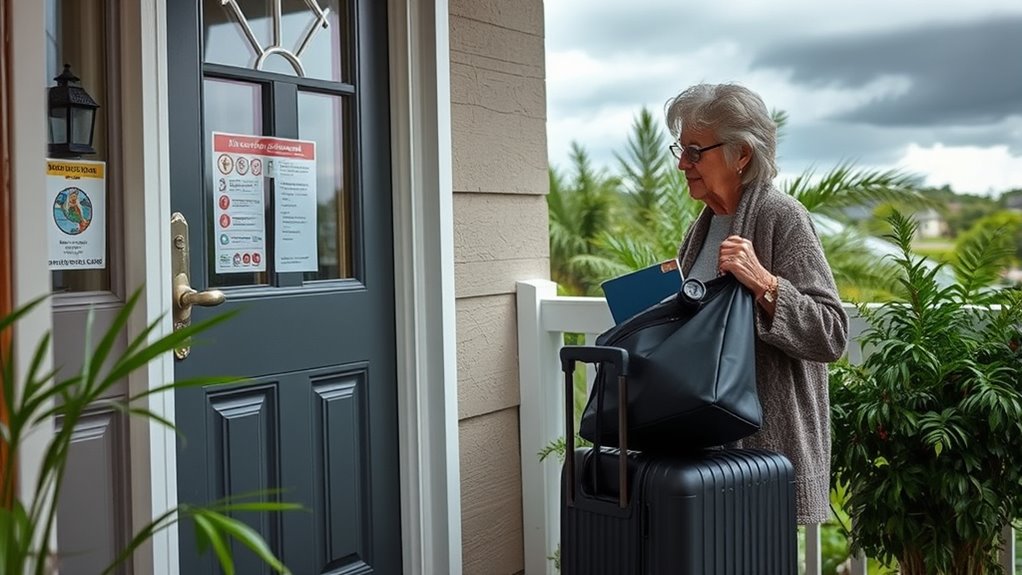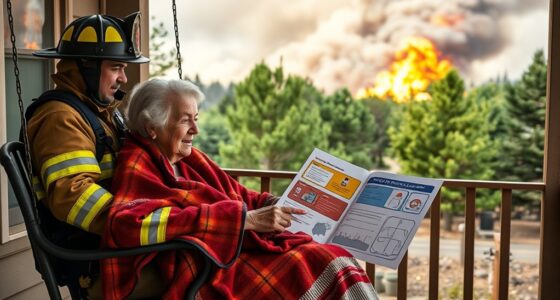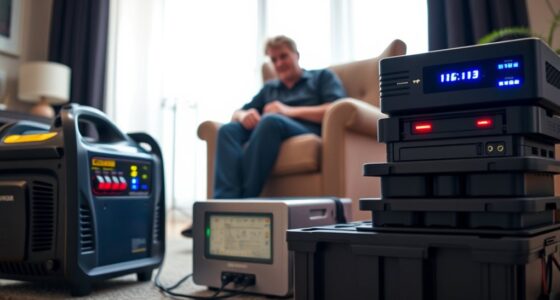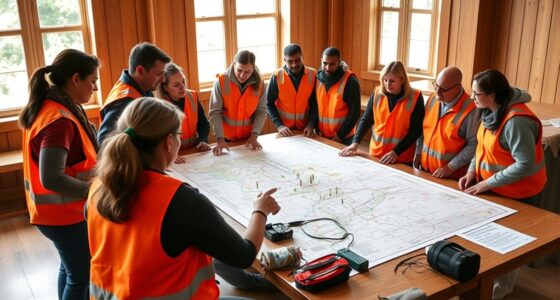To guarantee seniors evacuate safely during a hurricane, first sign up for local alerts and keep a battery-powered radio handy. Pick a nearby shelter that can support medical devices and mobility needs. Confirm transportation options and prepare an emergency kit with medications and essentials. Check that the shelter is accessible and safe for high winds or flooding. Staying prepared can make a big difference; continue with these tips to learn more on protecting your loved ones effectively.
Key Takeaways
- Verify shelter accessibility and medical support to ensure it meets seniors’ needs.
- Prepare an emergency kit with medications, medical supplies, and essential items.
- Arrange reliable transportation and establish an evacuation plan with family or caregivers.
- Keep a list of emergency contacts, medical information, and local resources readily available.
- Stay informed through battery-powered radios and local alerts for timely updates.

Hurricanes can pose serious risks, especially for seniors who may face mobility challenges or health concerns. When a hurricane threatens your area, preparing for evacuation becomes essential. One of the first steps is establishing effective emergency communication. Make sure you have multiple ways to receive alerts—sign up for local emergency notifications, keep a battery-powered radio, and stay in touch with family, friends, or neighbors who can help relay information. Having a clear plan for how you’ll receive updates ensures you’re not left in the dark when seconds count. It’s also wise to designate a trusted person outside the storm zone who can assist with decision-making if needed. This helps avoid confusion when the weather worsens and quick action is necessary.
Once you’re informed about the imminent threat, you need to focus on shelter selection. Picking the right shelter is critical, especially if you have health concerns or limited mobility. Your first priority should be identifying a shelter that’s accessible and equipped to meet your needs. Contact local emergency management to find out which shelters are open and whether they can accommodate your specific requirements, such as wheelchair access or medical support. If you have a medical device or medication, confirm that the shelter can provide or allow you to bring these essentials. Consider choosing a shelter close to your home to minimize travel time, but also verify it’s a safe and reliable location in case of flooding or high winds. Many communities designate special shelters for seniors or individuals with disabilities, so be sure to check if those are available. Additionally, home safety measures can help protect you during emergencies and make evacuation easier if needed. Preparing an emergency contact list with local emergency resources and support services can also provide additional assistance during a crisis. Maintaining a well-stocked emergency kit with essentials including food, water, and medical supplies is crucial to ensure your safety during and after evacuation.
Frequently Asked Questions
How Can Seniors Prepare if They Have Mobility Impairments?
If you have mobility impairments, you can prepare by gathering assistive devices like walkers or wheelchairs to stay mobile. Make certain your home has accessible routes that are free of obstacles, making it easier to evacuate quickly. Keep important contacts and emergency supplies nearby, and let someone know your needs in advance. Planning ahead helps you feel more confident and ready to evacuate safely when a hurricane approaches.
What Specific Supplies Should Seniors Prioritize During Evacuation?
When evacuating, you should prioritize essential supplies like an emergency kit with water, non-perishable food, medications, and hygiene items. Don’t forget important documents such as IDs, insurance papers, and medical records, stored in waterproof containers. These supplies guarantee your safety and quick access to necessary information. Being prepared with these items allows you to evacuate smoothly and reduces stress during emergencies.
How Can Family Members Assist Seniors in Evacuation Plans?
Ever wonder how you can ease your loved one’s evacuation? You can help by establishing clear family communication and ensuring they know their emergency contacts. Talk through evacuation routes, pack essential supplies together, and remind them of safety procedures. Your support makes a difference—by staying connected and organized, you help seniors feel more secure and confident during emergencies. Are you ready to create a solid plan that keeps them safe?
Are There Community Programs Offering Transportation for Seniors?
Many communities offer transportation programs to help seniors with mobility needs. You should check if your local area provides community transportation or senior mobility services, which can be essential during emergencies. These programs often include shuttle services or volunteer driver options, making evacuation easier and safer for seniors. Contact local senior centers or government offices to find out what’s available in your community and guarantee your loved ones can evacuate smoothly if needed.
What Medical Considerations Should Seniors Address Before Evacuation?
Imagine Sarah, a senior with diabetes, needing her insulin during evacuation. You should review your medication management, guaranteeing you have enough supplies and copies of prescriptions. Also, confirm your emergency contacts are updated and accessible. Discuss your medical needs with your healthcare provider beforehand, and carry essential medications, medical devices, and a list of allergies. Proper planning helps ensure your safety during evacuation, avoiding health risks.
Conclusion
Remember, over 60% of hurricane-related deaths occur in homes, highlighting the importance of preparedness. As a senior, having a plan and knowing your evacuation routes can save your life. Make sure your emergency kit is stocked and your contacts are informed. Don’t wait until the last minute—being proactive reduces panic and increases safety. Stay informed, stay prepared, and remember that your safety is worth every effort.









